MAX M LAWYERS HAS A TEAM OF SKILLED AND QUALIFIED LEGAL PROFESSIONALS WITH SIGNIFICANT EXPERIENCES IN VARIOUS AREAS OF LAW AND IN WIDE-RANGING CASES ARE CONSIDERED TO BE LEADERS IN THEIR RESPECTIVE FIELDS
Family Law
Litigation
Criminal
Civil
Conveyancing
Divorce/Seperation
How to apply for divorce?
1. Before you start:
You can apply for a divorce by yourself (sole application) or together with the other party to the marriage (joint application).
If you make a sole application, you will be required to serve the application on the respondent. Court attendance is required if there are children under the age of 18 years. Court attendance is not required if you file a joint application.
2. Are you eligible to apply?
You (or the other party to the marriage) must answer YES to at least one of the following:
● Were born in Australia or have become an Australian citizen by descent (born outside Australia and at least one parent was an Australian citizen and your birth is registered in Australia).
● Are an Australian citizen by grant of Australian citizenship (a citizenship
certificate will be required).
● Are lawfully present in Australia and intend to continue living in Australia. You must have been living in Australia for at least the last 12 months – evidence must be provided e.g. your passport showing the date of arrival at least one year prior and a valid or current visa.
To get a divorce you must have been separated for 12 months and 1 day or longer.
3. Do you have your marriage certificate?
If you have been married less than two years you will need to file a counselling certificate. If you have been separated and living in the same residence for any part of the twelve months prior to filing your application you will need to provide extra evidence to prove that there has been a change in the marriage by preparing and filing an affidavit.
If there are children of the marriage who are under 18 years of age
it is important to provide particulars of the arrangements including housing.
If you are unable to locate your spouse, even after you have taken all reasonable steps to locate them you will need to upload a further application seeking an order to dispense with service or for substituted service. If you are living overseas you may still be eligible to apply for a divorce in Australia. Parties to a divorce that were married overseas can apply for a divorce in Australia.
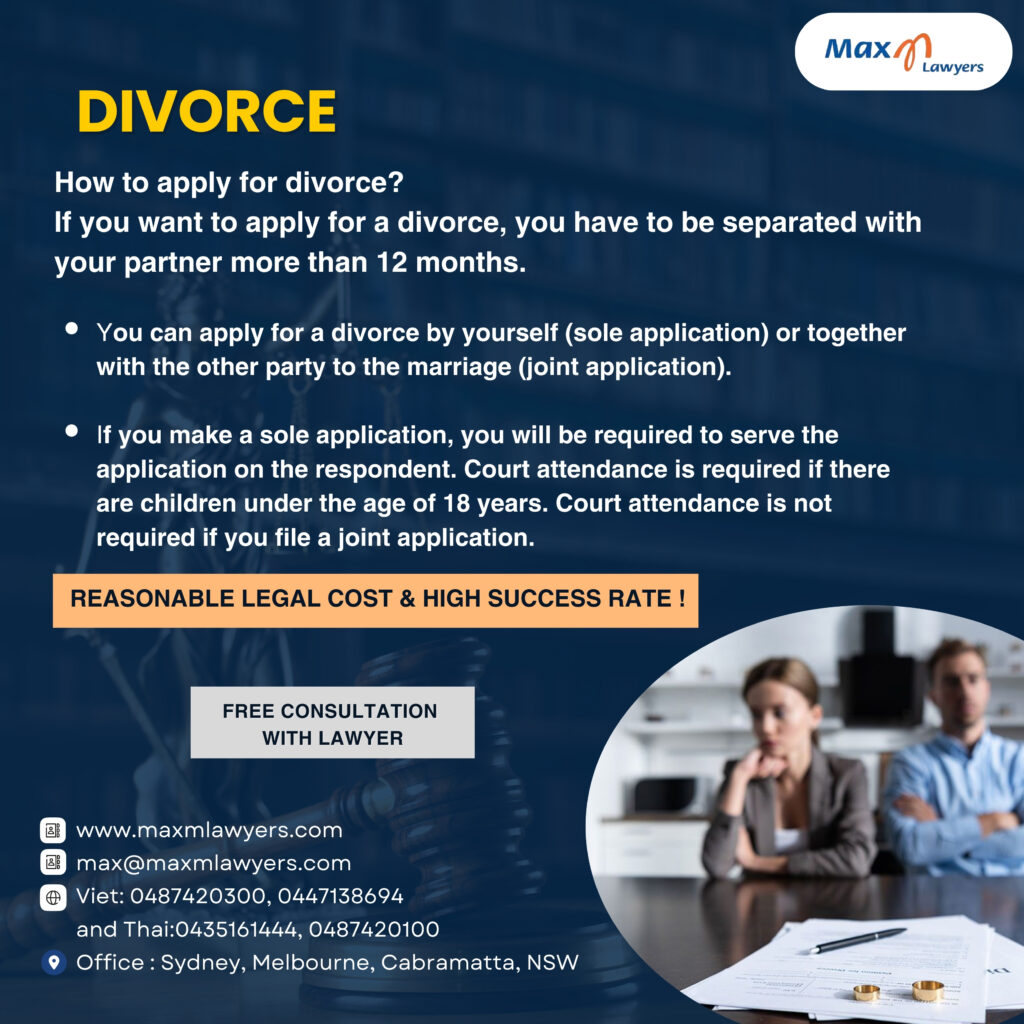
Property Division (Financial agreement)
A binding financial agreement is an agreement that is entered into after two people separate. A binding financial agreement is a far less expensive and stressful alternative to costly and time-consuming court proceedings.
If you are divorced you must formalise your property settlement within 12 months of your divorce.
There are three types of financial agreements: Before marriage agreements, During marriage agreements, and After divorce agreements.
It is a legally binding and enforceable document that formalises your property settlement setting out the terms of a financial separation between two people. A binding agreement provides both you and your former partner with legal certainty regarding the division of assets and debts of your relationship. This can include things such as the family home, vehicles, investments, and even superannuation.
Each party must carefully consider their options and what is in their best interest prior to signing a binding financial agreement. We will advise you what you are entitled to and assist you in making this important decision.
Each person must have received independent legal advice before signing the
financial agreement. one person cannot tell the other that they will not marry them unless they sign a prenuptial financial agreement. Both parties should contain a complete disclosure of each person’s financial circumstances. A couple in a de facto relationship separate can use this agreement also including those in a same sex relationship. One of the benefits of using a binding financial agreement is that you do not have Court involvement.
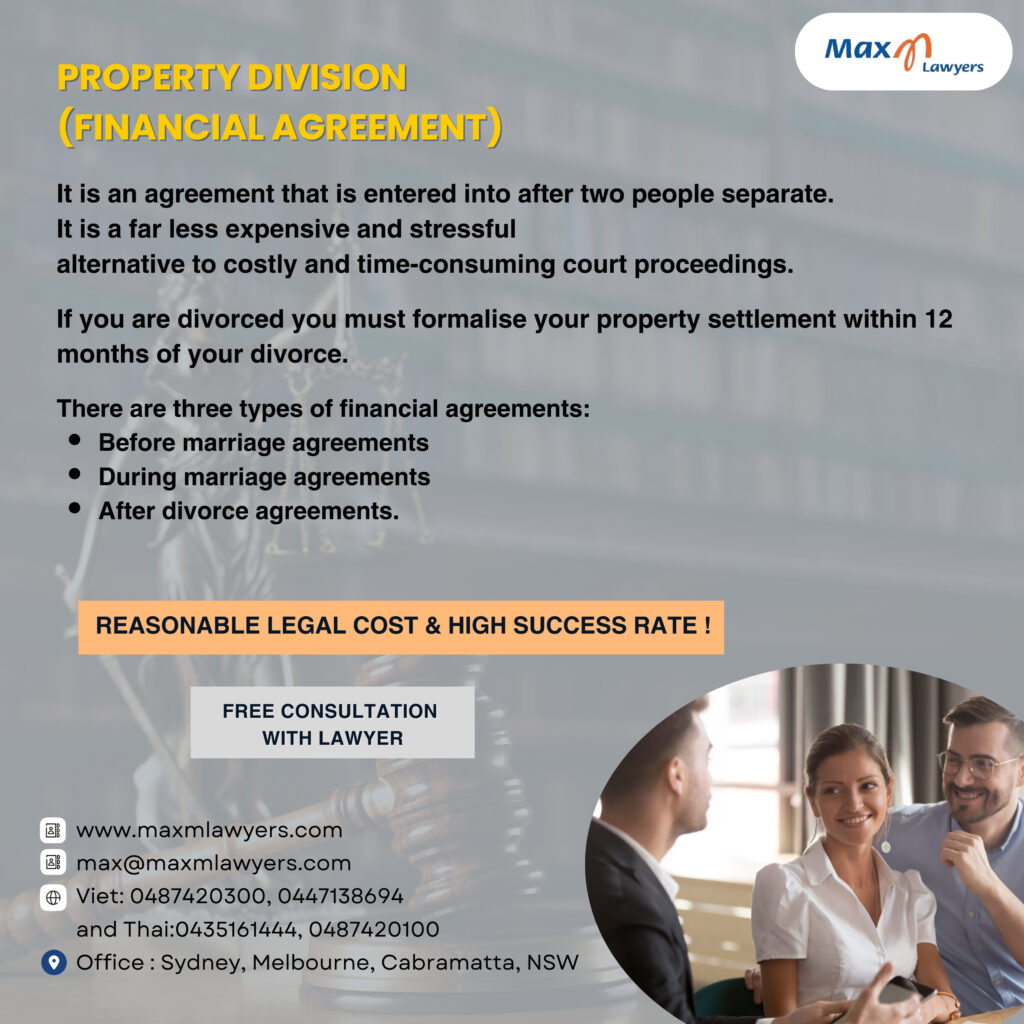
Child Custody/maintenance
Children’s matters must be resolved by a consent order or a parenting plan.
An application for consent orders is filed with the Family Court of Australia. These orders formalise the agreement parents reach regarding the long term care, welfare and living arrangements for their children. Consent orders, once made, are final and may be subject to a contravention application, should one parent refuse to comply with the terms of the order. Both parents are obliged to comply with the order once made.
In the alternative, parents may enter into a parenting plan to formalise arrangements in relation to children. A parenting plan is similar to consent orders and may deal with:
● the amount of time in which the parents would spend with the child;
● where the child may live;
● the allocation of parental responsibility;
● communication with the child;
● the process for resolving disputes about the living arrangements of the child in the future; and
● the process to be used for changing the plan, taking into account the changing needs and the circumstances of the child.
Because the parenting plan is not a legally enforceable document that is filed with the Family Court, parenting plans cannot be subject to any application for contravention and are therefore not enforceable by the Court.
Can a binding financial agreement be set aside (made invalid)?
Yes, a binding financial agreement can be overturned by the Court for several
reasons. Common reasons include:
1. Non-disclosure – If a party does not disclose the full extent and value of their assets at the time when the agreement was drafted and signed, it may be set aside.
2. Unreasonable Pressure – If a party unreasonably pressures or coerces the
other party into signing the agreement, it may be set aside.
3. Unfairness – If an agreement is not just and equitable (fair), it may be set
aside.
4. Fraud – If an agreement was obtained by fraud, it may be set aside.
5. Defrauding or defeating a creditor – If an agreement was made to defraud or defeat a creditor (or creditors), it may be set aside.
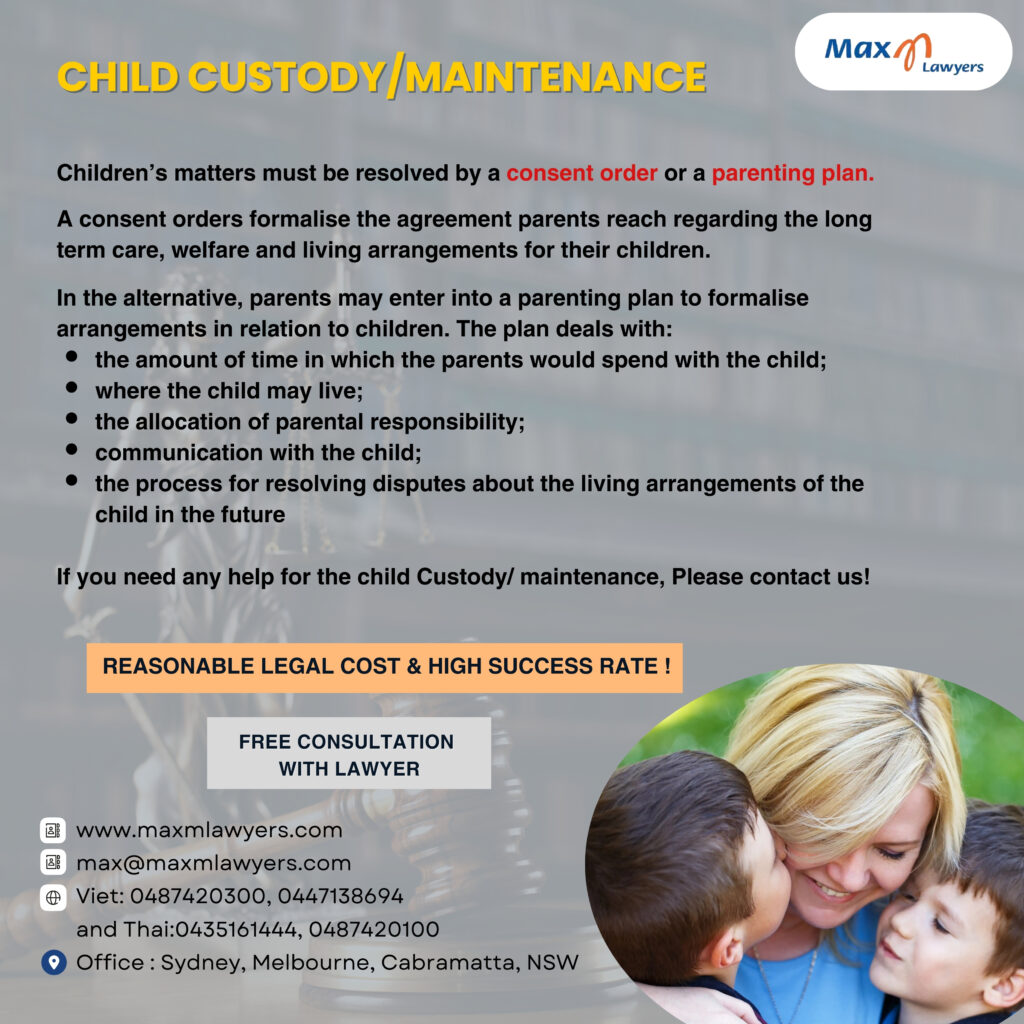
Drinking Driving
Drink driving convictions can stay on your record for up to 10 years.
For a drink driving charges, we recommend you to contact our specialized
drink driving lawyers.
There are 6 main types of drink driving charges. Each have their own
threshold limit and penalties. These include driver license disqualification
periods, fines, imprisonment and a criminal record.
It’s a crime to drive a vehicle with the threshold amount of PCA.
It is illegal to drink alcohol while driving.
The court may hear evidence of police officer’s observation(s) as to the
extent an accused person was under the influence to prove the charge.
It’s therefore extremely risky to put a number on how many drinks you can
before driving.
When appearing in court for a drink driving charge, you can either plead ‘guilty’ or plead ‘not guilty’ to the offence.
If you plead ‘guilty’ to a drink driving offence in court, the Judge or Magistrate will proceed to sentence. This involves determining an appropriate penalty to impose on you after hearing any further evidence you wish to produce to get a lenient outcome.
If the Judge or Magistrate imposes a non-conviction penalty on you as a sentence, you will not be disqualified and you will also remain conviction-free for the offence.
If you plead ‘not guilty’ to a drink driving offence in court, the Judge or Magistrate will adjourn your case to another court date for hearing. On the hearing day, the court will decide on whether you’re ‘guilty’ or ‘not guilty’ after hearing evidence from both sides.
Where the court finds you to be ‘not guilty’, your charge will be dismissed, putting an end to your case without any penalty.
Where the court finds you to be ‘guilty’, the Judge or Magistrate will decide
on an appropriate penalty to impose during sentencing.
Drink driving laws in NSW are complex and can be difficult to both navigate and understand.
If you want to know more about for drink driving, how to get away with a drink driving charge, speak to our specialized lawyers. Normally, when you get disqualified or suspended, either police or the court will seize your driver licence from you. It is an offence to drive on a road in NSW without a valid driver licence. For this reason, to get your licence back after drink
driving, you must re-apply for a licence.
The penalties, consequences or punishment for drink driving varies depending on the type of drink driving charge you face, your traffic record, whether you have any prior drink driving or traffic offences, and the objective and subjective features of your case.
Drink driving is a summary offence. What this means is that drink driving is an offence dealt with only by the Local Court by a Magistrate who is limited in to imposing a maximum penalty of no more than two years imprisonment for any single offence.
Objective features here, is when the sentencing Judge or Magistrate looks into factors such as the reason you drove while intoxicated, the number of people in the vehicle with you at the time, the distance you were travelling while drunk, the extent of your BAC reading, and whether there was any unusual driving that caused police to breath test you at the time (i.e.
accident, swerving, running through red traffic light or breaking any other
traffic rules).
Subjective features is based on your prospects of rehabilitation including your mental health at the time, whether your mental condition contributed to you drinking to that extent, your treatment and progress, the impact of a conviction on your job, income and family dependents who rely on your income and ability to drive.
Subjective features also include, your age, expressions of any remorse, insight and acknowledgment of wrongdoing, so that the Court can judge whether or not you’re likely to re-offend.
The sentencing Court will consider which one of the following types of drink
driving penalties to impose on you during sentence:
When a court imposes a penalty that carries a conviction, it will also result
in a license disqualification period, with a criminal conviction.
A successful defense will result in you being found ‘not guilty’ in court after
The Magistrate hears all the evidence in court.
If the court convicts you for a drink driving offence, you will be disqualified
from driving for the specified period.
It is possible to walk out of court without a criminal record and without a
disqualification of your driver license even after pleading guilty to a drink
driving offence.
A drink driving criminal record remains a conviction on your record (before it is “spent”) for a period of 10 years in New South Wales.
The charge papers will include the statement of the reading you gave, your court attendance notice showing your court date and drink driving charge. It usually also includes a statement of police facts.
Call us to arrange a free consult today. We appear across all courts.
Contact us 24/7 on (02) 8606 2218 to get a quote for a fixed fee today
We strongly recommend hiring a drink driving lawyer for your drink driving
offence if you need to avoid a criminal conviction and license
Disqualification. This is more so, if you have dependents who rely on your job and drivers license to drive.
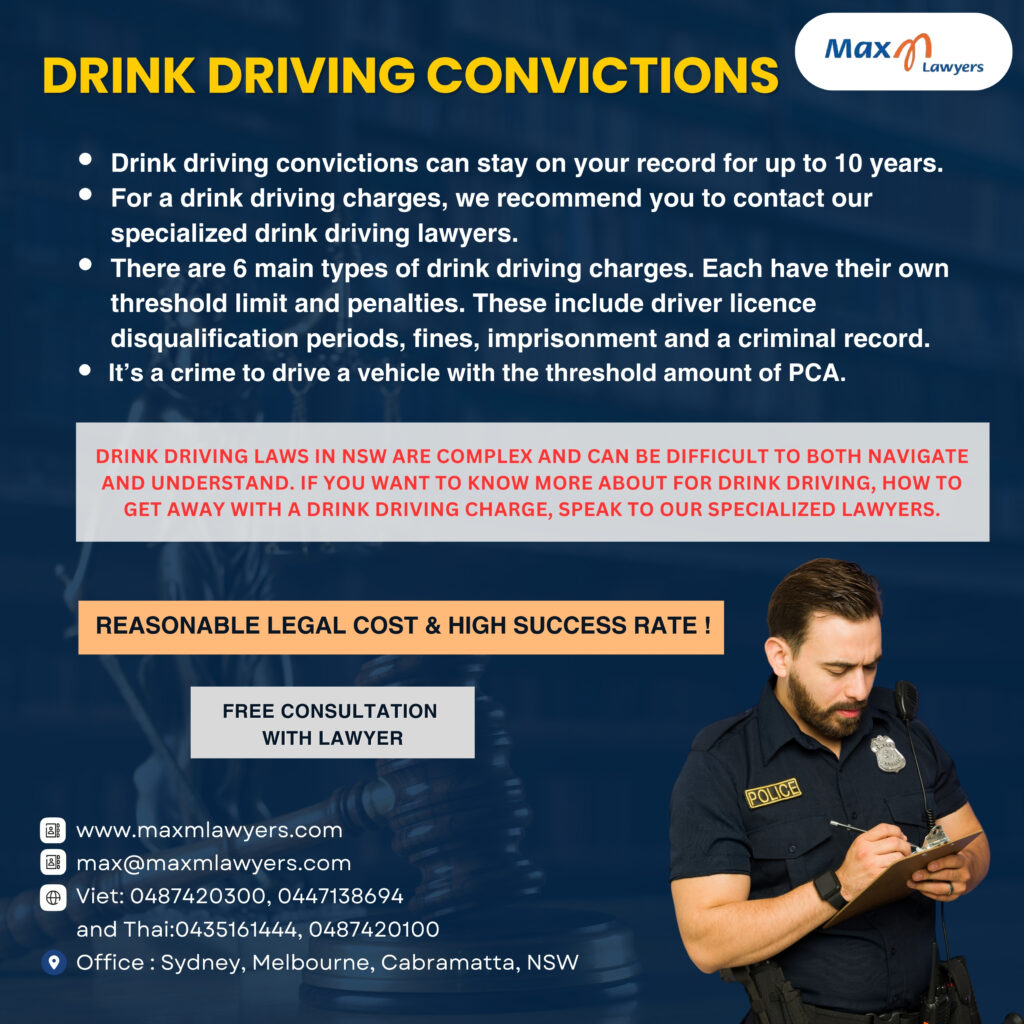
Traffic accident
If you’re involved in a traffic accident, it’s essential to follow specific procedures to ensure safety, comply with legal obligations, and facilitate any necessary insurance claims. You should ensure Safety and Provide Assistance, stop Immediately, check for Injuries and prevent Further Hazards. You must report the accident to the police if anyone is injured or
killed, a driver involved does not provide their details, a vehicle needs to be towed from the scene, and police are required to direct traffic or deal with hazards.
Collecting evidence can be crucial for insurance claims and any potential legal proceeding. The party at fault is typically determined based on negligence. If a driver fails to exercise reasonable care, they may be held liable for damages. In some cases, both parties may share responsibility. This can affect compensation claims and insurance payouts.
For the personal Injury Claims, generally, you have six months from the date of the accident to lodge a personal injury claim. However, it’s advisable to act within 28 days to ensure full entitlements. For the property Damage Claims, you have up to six years to commence legal action for property damage resulting from a car accident. If there is the dispute, you can apply for the court proceedings. For property damage claims under $20,000, you can file a
claim in the Small Claims Division of the Local Court. Legal representation is optional but can be beneficial. For claims exceeding $20,000, consider seeking legal advice to navigate the complexities of the legal process.
Navigating the aftermath of a traffic accident can be challenging. Understanding your legal Rights and obligations are essential to protect yourself and ensure a fair resolution. If you’re facing serious charges, disputes over fault, complex insurance issues, or if you’ve been
charged with a traffic offence, consult us. Our specialized lawyers will offer resources and assistance for such matters.
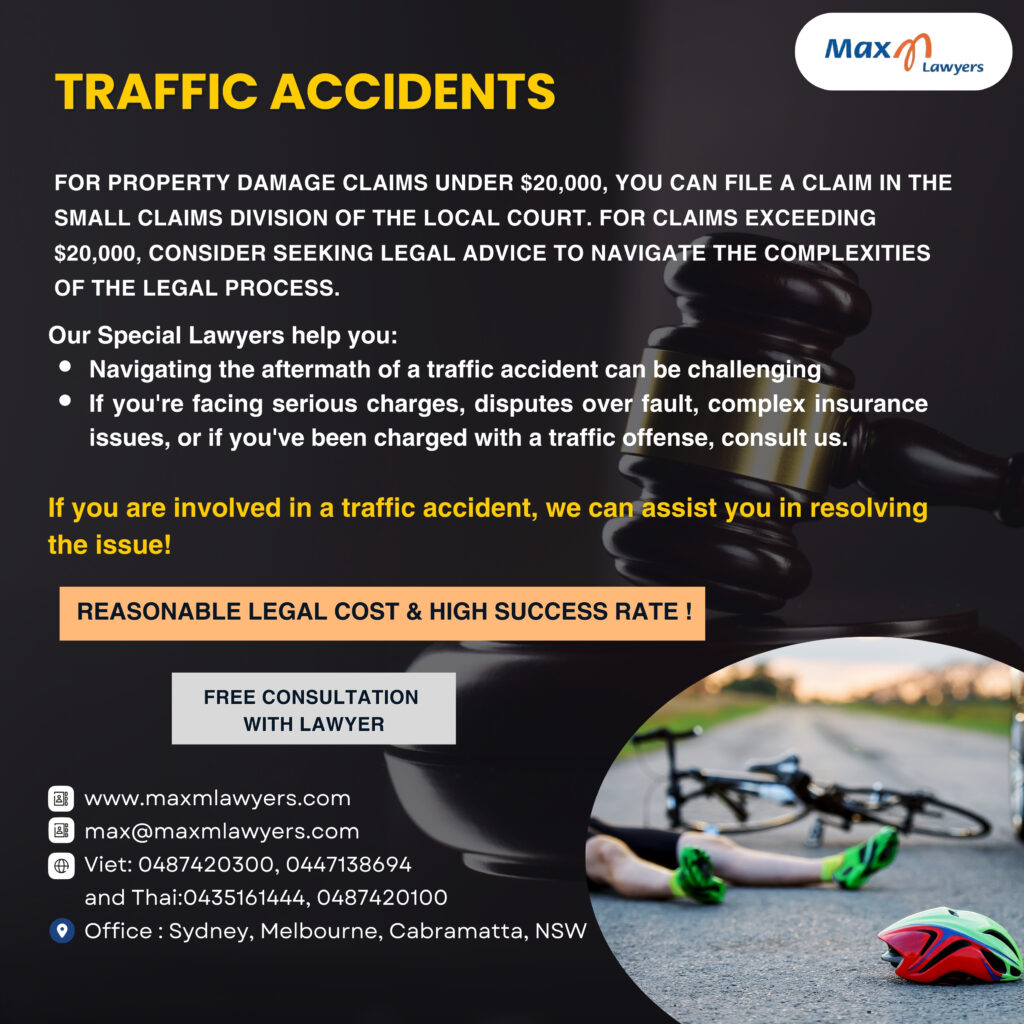
School Problems
Everyone in our school community deserves to be respected, valued and treated equally.
Discrimination or abuse based on religion or race is not tolerated in the school communities.
It’s always okay to talk to the school about your child’s wellbeing or learning. If your child has been the target of, or has witnessed, religious or racial discrimination or abuse, you are encouraged to report it to your school.
If you’re still not satisfied you can make a complaint. A complaint is a concern you may have that affects your child’s learning or wellbeing. Members of the public, mature minors, adult students and advocates may also raise a concern about actions taken or service provided by
the school that affects the community. If you do not feel comfortable raising concerns directly with the school and the issue is complex, you can contact us to discuss your concerns and offer options for moving forward.
You have the specialized lawyers to support you at any time while making a complaint. We can help you clarify the issues, discuss difficulties you’re having about the complaint, help create a good working relationship between you and the school and help you understand our policies and any resolutions proposed.
Our law firm is best placed to work with you to fix your concerns. You will have the opportunity to explain your concern and what you are seeking as a resolution. Contact us by phone, email, via our online form.
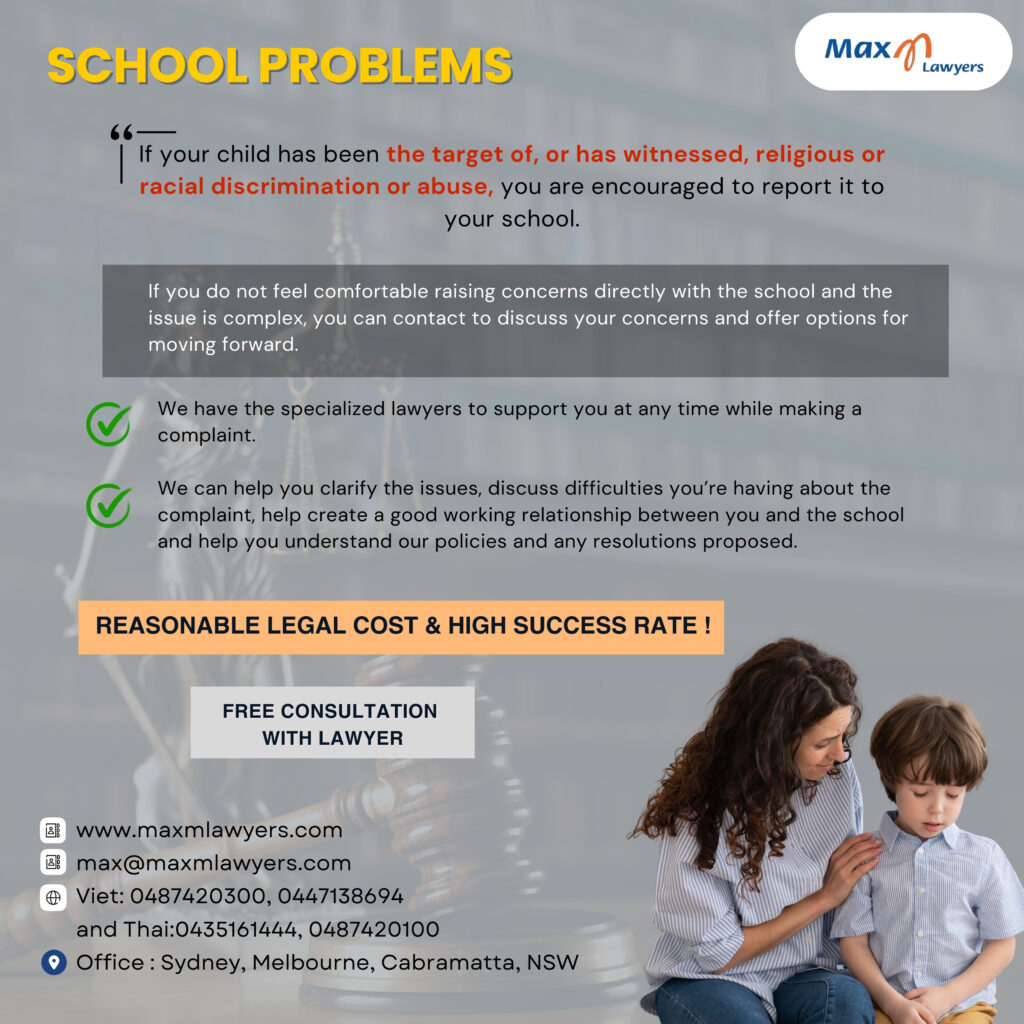
Employment dispute
Our services include contracts of employment, discrimination, investigations, fair work ombudsman, unfair dismissal, and partnership disputes. We take the time to explain the law, explore options with you and formulate strategies that work towards your desired outcome.
Our employment lawyers represent clients who believe they’ve faced discrimination in the workplace due to race, gender, religion, disability, age, sexual orientation, or other protected characteristics. They help clients who believe they’ve been wrongfully terminated or assist employers facing such allegations.
We provide legal advice to both employers or employees, giving insight into both sides of any potential dispute. Our employment lawyer specializes in employment-related issues and represents both employers and employees, ensuring that workplace rights are upheld and that both parties are compliant with applicable laws. Our focus is on your situation and how best to help you resolve your concerns with the workplace. We will provide practical advice at resolving issues as quickly as possible with reasonable cost.
Many employment disputes are resolved through mediation or arbitration. Employment lawyers represent their clients in these less formal settings, aiming for resolutions without going to court.
If disputes can’t be resolved through negotiation or alternative dispute resolution, employment lawyers will represent their clients in court.
If you need help, please contact us. Our offices are located in Sydney, Melbourne and Cabramatta NSW.
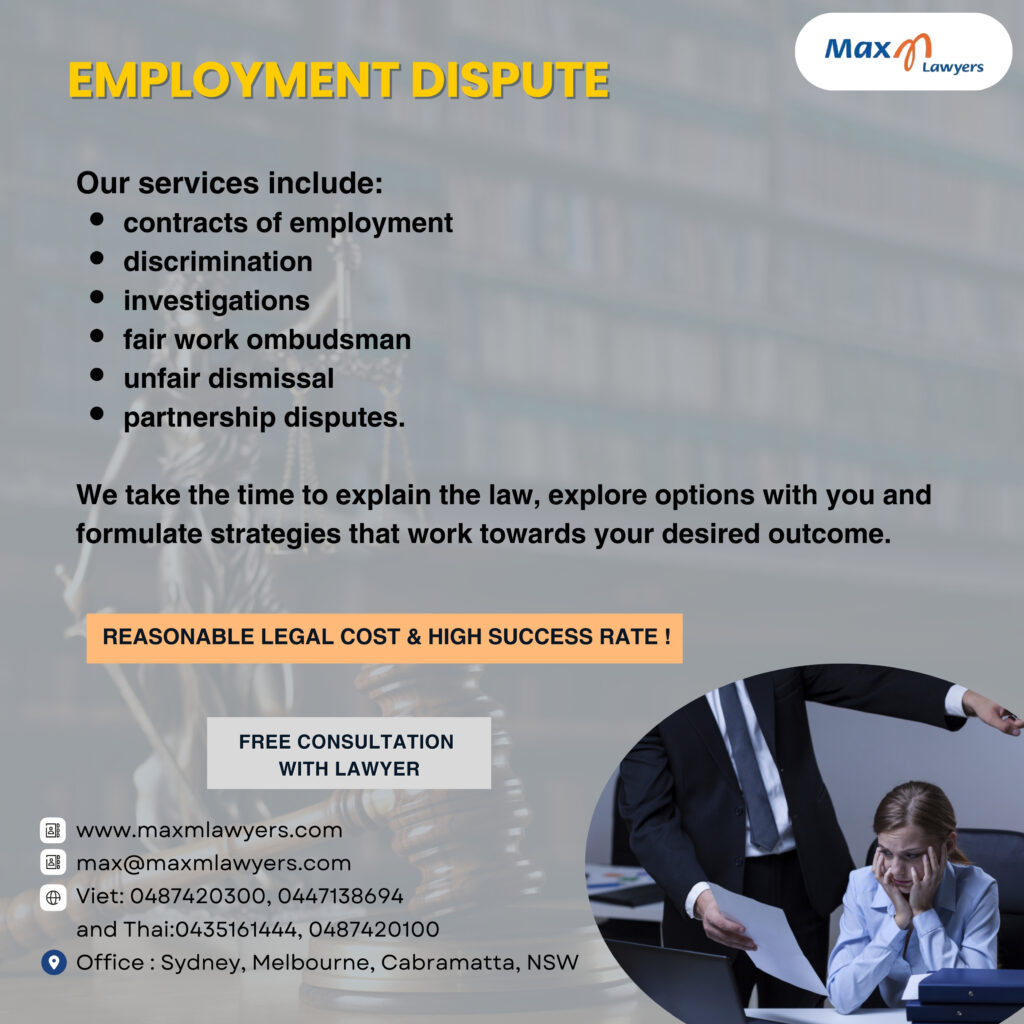
Employment contract
Employment contracts are legally binding agreements between employers and employees that set out the terms and conditions of employment. Employment contracts are vital to the working relationship between employers and employees. Generally, employment contracts
are in writing and signed by both the employer and employee. They offer protection to both the employer and the employee in the event that the contract is breached or something does not go according to plan. Ensuring that your business’ employment contracts are of adequate standard is pivotal to your business’ livelihood.
A legally sound employment
contract can provide you and your business with legal certainty, protect you from legal risk and provide you with the opportunity for legal recourse if ever required. Employment lawyers draft, review, and negotiate employment contracts to ensure that terms are clear and protect the rights of their clients. They assist with issues related to unpaid wages, overtime, minimum wage violations, and other compensation-related disputes.
Employment lawyers ensure that workplaces adhere to safety regulations and standards. They might represent employees in cases of workplace injuries or unsafe conditions.
Employment lawyers provide counsel on workplace harassment issues, including sexual harassment, and represent clients in related claims. Employment lawyers can help you draft employment contracts and conduct employment contract reviews. It contains details such as what tasks the employee will be required to perform, what pay they will receive and what
happens if something were to go wrong.
It is imperative that employment contracts are adequately drafted and regularly reviewed.
Engaging qualified, experienced and knowledgeable employment lawyers can be pivotal to your business’ legal, operation and ultimate success. Having an employment lawyer assist with the drafting and reviewing of your employment contracts will help ensure that your employment contracts are sufficient. If you need help, please contact us.
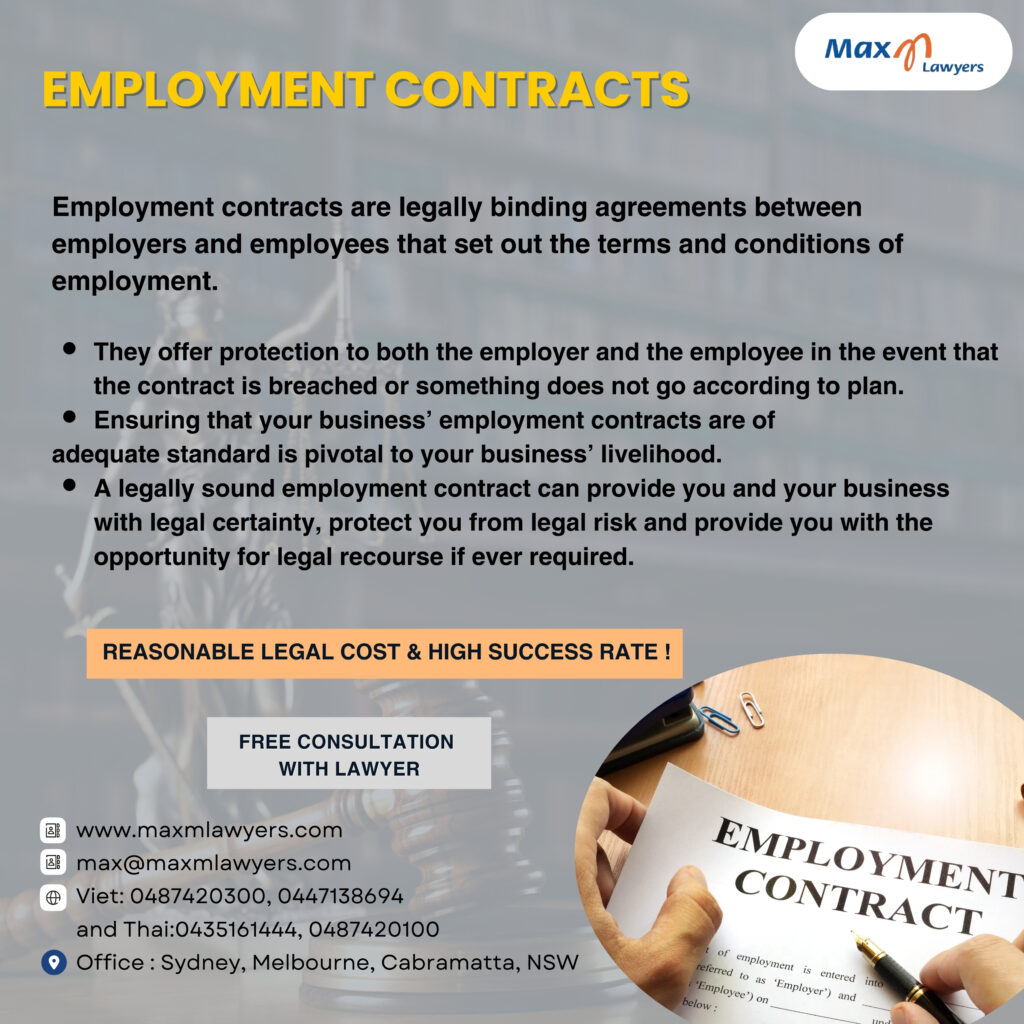
Commercial lease
A commercial lease agreement is a document that gives a Lessee the right to occupy and use a commercial space for the specific purpose as outlined in the agreement. It will define the terms of the occupation and the responsibilities of both the Lessee and the Lessor (the
Landlord).
Typically, a Lease will cover the following main points:
● Description of the premises to be leased;
● The terms of the arrangement;
● Options available to renew the term;
● The rental amount and provisions for rent increases;
● Maintenance and repair obligations for both the property and its fixtures for each party;
● Responsibilities for additional costs like insurance, outgoings, and utilities;
● Permitted use for the premises; and
● Liability and indemnity clauses for injuries, damages, or claims.
In New South Wales, a commercial lease with a term of over 3 years must be
registered. Registering a lease offers greater legal protection by creating a strong and enforceable leasehold estate and will safeguard the rights of Lessors and Lessees.
Once registered, the lease becomes a legally recognized and enforceable
agreement. This ensures a solid basis for resolving conflicts or disagreements that may arise and deters unauthorized alterations to the lease terms, adding an extra layer of security for all parties. Should it not be registered, the Lessee would then only have an equitable interest in the premises which is unenforceable against any competing registered interest.
There is no longer a requirement of the stamp duty however it is still required
on the assignment or transfer of a Lease.
Outgoings are additional costs related to the property that the Lessee may be
responsible for along with the rent. These expenses should be clearly stated in the lease document.
Outgoings can significantly impact your expenses, so it is important to know
what they may be before entering into the agreement. Common outgoings
within commercial leases include:
● Local council rates and charges;
● Land tax;
● Insurance premiums;
● Strata or community levies;
● Sewerage and drainage fees; and
● Management fees, if a property manager is involved.
During lease negotiations, it is integral that these expenses are correctly identified, and that each party’s responsibility is understood to avoid surprises during the term.
If the lease is silent on an option period and the lease term is approaching its end, the Lessor is at liberty to refuse to renew a lease. Often commercial leases do allow the tenant to continue occupying the premises on a month-to-month basis after the fixed term ends, with either party having the right to terminate the lease by giving the appropriate notice period as provided for in the lease.
However, if there is an option clause within the lease and this is properly
exercised by the Lessee, the Lessor is obligated to enter the new lease.
The Lessee can assign or sub-let their interest in the Lease to a third party unless the Lease specifically prevents these actions. The Lease will contain clauses that necessitate the Lessor’s consent be obtained and the conditions that need to be met to obtain such consent, or alternatively, will exclude such actions entirely.
In the event a commercial premises, which are subject to an existing Lease, is
sold, the terms of the Lease will extend to the new owner.
Firstly, carefully review the lease terms. Often, the document will contain specific dispute resolution clauses outlining the required steps for determining conflicts.
Typically, this starts with an informal discussion between the parties to try and resolve the issue. Given its importance, seeking legal advice before signing is crucial. We can offer guidance on lease terms and advise on negotiation strategies or clauses to modify or remove from the lease.
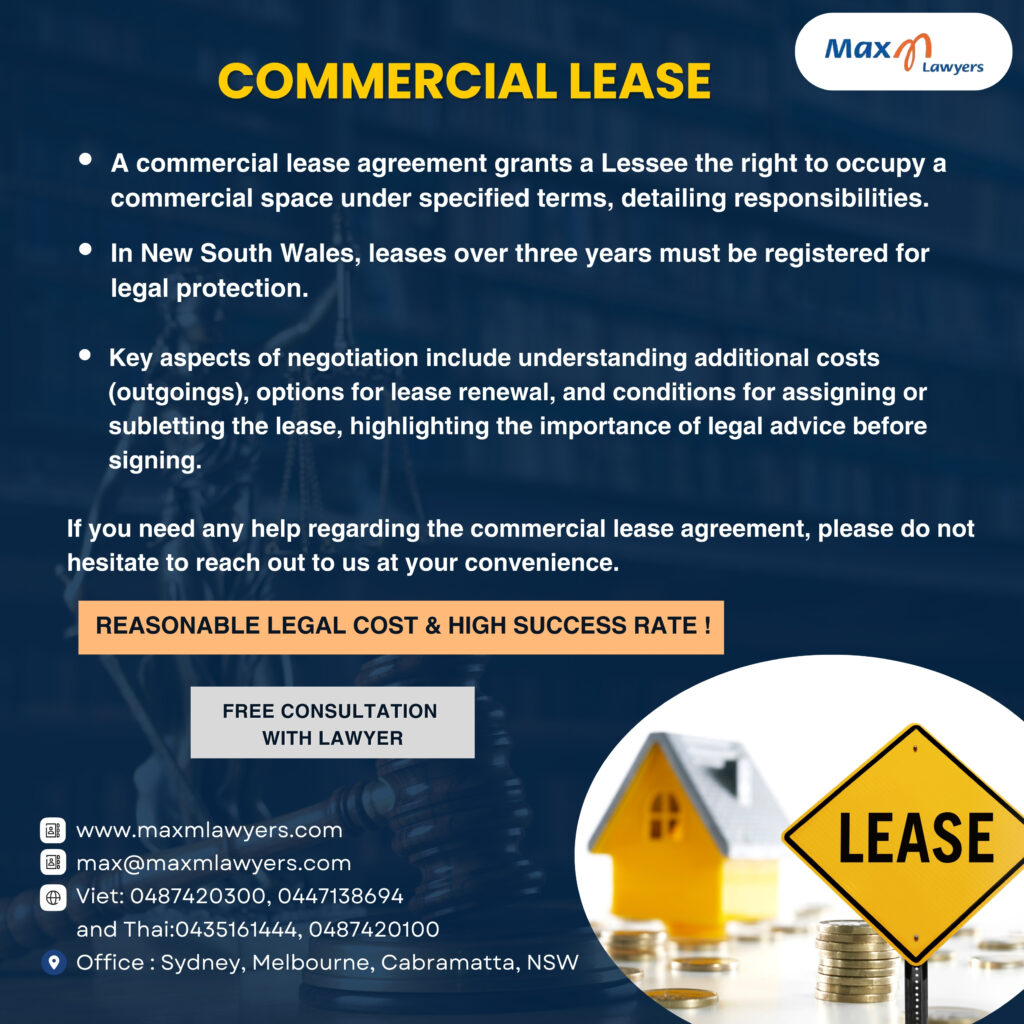
Residential Tenancy agreements
A residential tenancy agreement is a legal, binding agreement between a landlord and a tenant that sets out their rights and responsibilities.
It has certain standard terms required by residential tenancy law. It may also include additional terms if these are permitted by the law.
Landlords have an obligation to ensure that the tenancy agreement is in writing.
All agreements must follow the Residential Tenancies Act 2010 (‘the Act’).
There are two types of tenancy agreement
1. A fixed-term agreement is for a period of time and has a specific end date (e.g for six or 12 months).
2. A periodic agreement is where a fixed-term has not been specified in an agreement or where the fixed-term of an agreement has expired.
If a fixed-term agreement ends and a new agreement is not signed, a tenant will automatically move to a periodic agreement (also known as a continuing agreement). A periodic or continuing agreement has no specific end date.
What about additional terms in an agreement?
An example of an additional term is to allow pets. A landlord may decide if they want this term to stay in the agreement. If not, the term should be deleted before the agreement is signed.
Additional terms may be included as long as they:
● follow NSW tenancy laws or any other relevant laws,
● are consistent with the terms in the standard form and
● are not a term that is prohibited from being added to a tenancy agreement.
For fixed-term agreements of 20 years or more, landlords can remove or change the
terms of the standard agreement, except for the following terms:
● the responsibility of the landlord to pay rates, taxes and charges
● the limit of no more than one rent increase per year
● a tenant’s right to apply to the Tribunal
● the grounds on which the agreement may be terminated
● the landlord’s responsibility to repair smoke alarms
● a tenant’s responsibility for their visitors’; and co-tenants’; actions that are a breach of the tenancy agreement (e.g., damage to the property) and,
● the exceptions to a tenant’s responsibility under the residential tenancy law for damage occurring during a domestic violence offence.
Otherwise, the standard terms are taken to be included in fixed-term and periodic agreements.
Terms that must not be added to an agreement include:
● requiring a tenant to have the carpet professionally cleaned, or pay the cost of cleaning, at the end of the tenancy (except as part of a separate arrangement to allow the tenant to keep a pet on the property),
● requiring a tenant to take out any form of insurance, such as home contents or public liability insurance,
● exempting a landlord, agent or any other person from legal liability for any negligent act or omission,
● requiring the tenant to pay a higher rent, a penalty or some other form of damages if
they breach the agreement,
● giving the tenant a reduced rent or rebate for not breaching the agreement,
● requiring the tenant to use the services of a particular person or business to carry out their obligations under the agreement, such as a nominated lawn mowing or pool cleaning company,
● requiring the tenant to use a specific utility provider if there is no restriction on utility providers available for the property.
Any additional terms that are not allowed under the law are invalid and cannot be applied.
Landlords can face penalties for including such terms in an agreement.
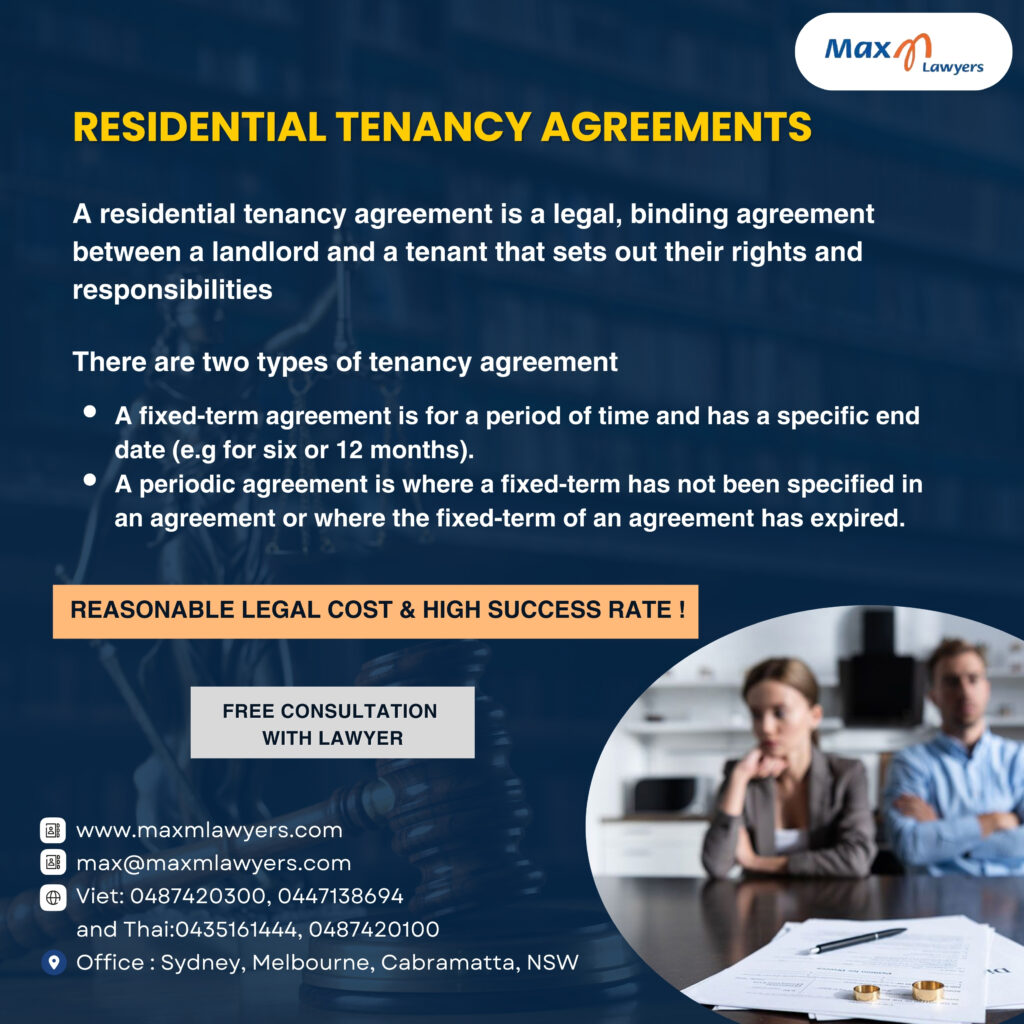
Business sale/purchase
The purchasers who have just signed up to buy their own business, full of hope and enthusiasm. They cannot wait to get into the business, want settlement in just a few days, and only need the practitioner to check the contract and make sure there are no major problems. Alternatively, it is the desperate vendor who cannot wait to sell and will do whatever it takes to just get settlement through cheaply and in the least amount of time.
There are few steps will give you what needs to be done before you actually start the process. You need to carefully analyse the procedure of buying or selling a business. Buying an established business or selling an existing one is a complex undertaking involving numerous considerations. The seller should prepare all equities, liabilities, profit loss statements, tax returns, ownership, and other information of the business will be reviewed.
The buyer and the seller should discuss the terms, such as:
(a) the cost of the business or the method of valuation of the business;
(b) what assets or portions of the business are being purchased or sold, including what intellectual property will be included in the deal;
(c) whether there is any pending litigation or other debts that need to be avoided in the transactions; They should make a letter of intent embody all agreed terms in writing from the time of negotiation. The buyer should review the lease agreements and disclosure statement. The seller also needs to satisfy the financial status of the buyer. The essential step is to make a draft of the agreement including all necessary terms and conditions.
The contract should also include:
(i) The representations and warranties to be provided by the parties;
(ii) Tax liabilities of the parties while selling or purchasing the business;
(iii) Indemnities to be provided by the seller;
(iv) Obligations of the parties to maintain confidentiality;
(v) Applicable State or Territory law governing the terms of the contract; and
(vi) Dispute resolution through negotiation and mediation including reference to arbitration in case of any dispute or breach of the contract.
A section 52 statement must be provided before the purchaser signs the contract or pays a deposit.
If the vendor fails to provide section 52 statement, the purchaser entitled to rescind the contract. The purchaser should have their accountant check the financials in the section 52 statement. Many vendors will have their accountants prepare the business operating report which forms part of the section 52 statement. The remaining part of the section 52 statement is sometimes overlooked because the practitioner does not clarify with the client who is to complete it. Where possible, the practitioner should insist on completing the section 52 statement or at least checking it before it is given to the prospective purchaser. If you are intending to enter in to the process of sale or purchase of any business, feel free to contact our lawyers.

